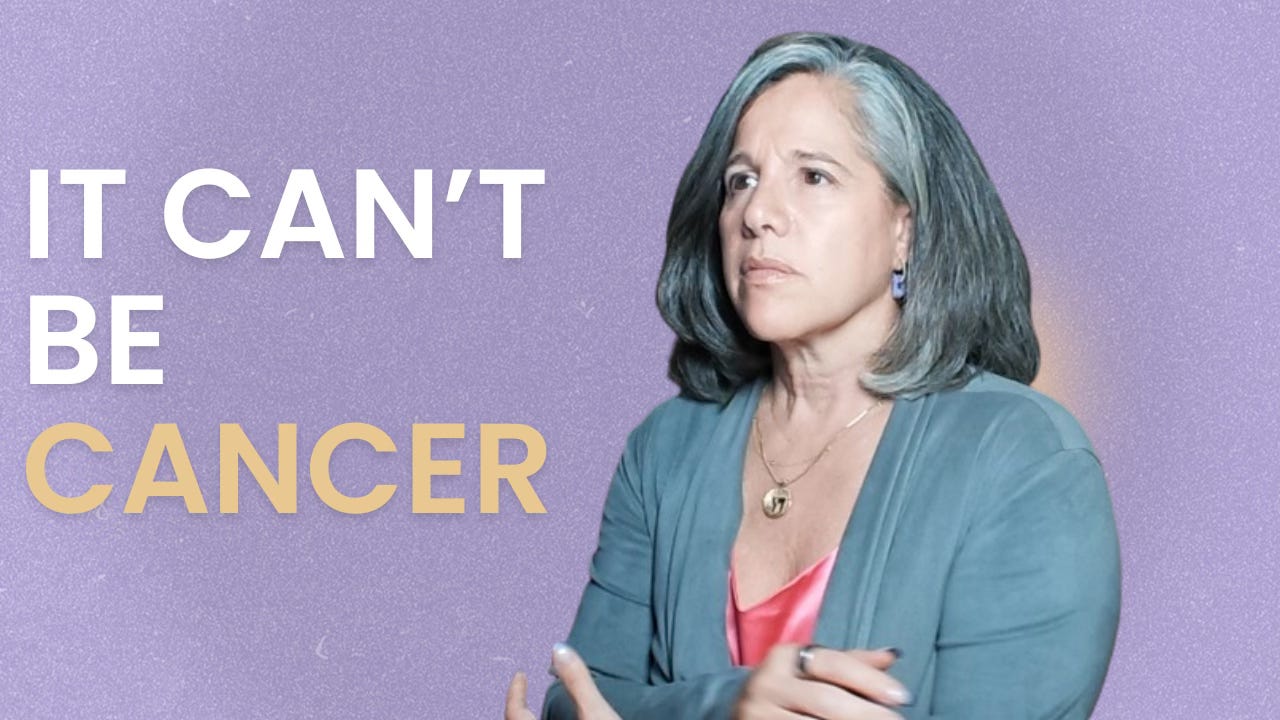Why Your Brain Goes Foggy When You Hear “It’s Malignant”
The biology of hearing you have cancer
I was on a Zoom call when my phone interrupted with a call from my doctor — and the dreaded words… “I’m sorry…it’s cancer (or malignant or positive)”. Maybe you were sitting in the doctor’s office. Or in the car, answering the phone. In the next moment, you feel the world stop spinning, and you are trying to catch your balance. Perhaps you’re nodding, catching fragments like “referral” and “next steps,” but you’re not really there. You’re trying to process what they’re saying while simultaneously wondering if this is actually happening to you.
I’ve spoken with hundreds of cancer survivors and patients - and we all experience the same reaction. It’s a physiological response, and understanding it matters more than you think.
Your Nervous System Just Got News
In this week’s episode, I walk through what happens physiologically when you get a cancer diagnosis. Not the medical staging or treatment protocols—those come later. I’m talking about what happens in your body before your brain can even catch up.
“When you get a diagnosis, your body reacts before your brain can catch up. You might need to find a surgeon or an oncologist. You might be deciding who to tell and what to say, but all of that is happening while your body is still in shock. You’re trying to make decisions with a brain that’s just been hit by lightning.”
That “brain hit by lightning” feeling isn’t metaphorical. Research published in The Lancet Psychiatry confirms that cancer diagnosis and treatment is experienced as a traumatic stressor, triggering post-traumatic stress symptoms in a significant minority of patients. A study in Palliative & Supportive Care found that after receiving shocking medical news, patients experience what clinicians call acute stress reactions—floods of cortisol and adrenaline that mirror the body’s response to immediate physical danger. Your nervous system jumped into fight-or-flight mode because it suddenly learned about a threat that’s been there for a while, but feels urgent right now.
You’re not weak. You’re not overreacting. Your body is doing exactly what it’s designed to do when it perceives threat.
The Question That Won’t Stop Whispering
Underneath the fear and the practical questions about treatment, there’s often another voice. Quieter but persistent: Did I cause this?
The “Why A Cancer Diagnosis Makes You Mad” mini-episode addresses this directly:
“You wonder what this means for your body, your family, your career, and underneath it all this quiet heavy question whispers, did I cause this?”
This isn’t random self-blame. Psycho-oncology research reveals that between 60-80% of cancer patients report feelings of guilt or self-blame in the early diagnostic period. The phenomenon is so common that it has a name: “cancer guilt.”
Why does this happen? Your mind is searching for control. If you somehow caused it—through stress, diet, not catching it earlier, not being careful enough—then theoretically you could have prevented it. Which means you might be able to control what happens next. Your brain attempts to make sense of something senseless.
But here’s what the research actually shows: A landmark 2015 study in Science found that approximately two-thirds of cancer mutations result from random errors in DNA replication during normal cell division—what the researchers called “bad luck.” Not your fault. Not something you could have prevented. The guilt serves no protective function. It just makes you carry something that isn’t yours.
The guilt serves no protective function. It just makes you carry something that isn’t yours.
What People Think Helps (vs. What Actually Does)
People mean well. They say things like “stay positive,” or “it’s not that bad,” or “you’re so strong.” Most mean well, they’re just scared too, and they don’t know what to say. Their discomfort isn’t yours to manage.”
The American Cancer Society directly addresses this in their patient education materials, stating explicitly: “Studies have shown that keeping a positive attitude does not change the course of a person’s cancer. Trying to keep a positive attitude does not lead to a longer life and can cause some people to feel guilty when they can’t ‘stay positive.’ This only adds to their burden.” The findings were striking:
What patients said made things worse:
Being told to “stay positive” (experienced as dismissive and pressure-inducing)
Minimizing the diagnosis (”at least it’s treatable”)
Being given advice about alternative treatments or lifestyle changes
People sharing stories about others who “beat cancer” with positive thinking
What patients said actually helped:
Simple acknowledgment: “This is really hard”
Presence without trying to fix feelings
Practical help offered specifically (not “let me know if you need anything”)
Permission to feel however they felt
There’s no right way to react to this. You can be furious one minute and completely numb. You can cry or not cry. You can laugh at something dark and weird. All of it’s normal. You don’t have to fix how you feel. You just have to let yourself feel it.
This matters because suppressing emotions doesn’t help. Research on emotional expression versus suppression in cancer patients shows that deliberate withholding of negative emotions is associated with higher psychological distress and poorer outcomes. When you keep feelings inside, they gain strength. When you let them out, they move through you.
The One Thing That Actually Works on Day One
You don’t need a treatment plan today. You don’t need to have processed this emotionally. You don’t need to be brave yet.
You need your nervous system to calm down enough that you can think.
The episode walks through box breathing: “Take one slow box breath. We’re gonna do on beats of four. Inhale, hold, exhale, hold. That single breath calms your body and helps you feel safe enough to think. It quiets the alarm bells so you can decide what’s important first.”
This isn’t just feel-good advice. A 2017 study in Frontiers in Psychology found that diaphragmatic breathing significantly decreased cortisol levels and promoted balance between the sympathetic and parasympathetic nervous systems. Research published in the Journal of Neurophysiology showed that controlled breathing practices can increase vagal tone (a measure of parasympathetic activity) by up to 30% after regular practice. Box breathing specifically activates the vagus nerve, which runs through the diaphragm and helps regulate the stress response.
You’re not trying to feel better. You’re trying to get your brain back online so you can make the next decision.
What This Means for Your Journey
Understanding the biology of shock changes how you move through those first days. You stop expecting yourself to function normally. You stop wondering why you can’t think straight. You permit yourself to be exactly where you are.
There are 20 million cancer survivors in the United States. Every single one of them went through day one. Each of them wondered if they’d ever feel normal again. And somehow, they found their way forward—not by being strong right away, but by being honest about how hard it was.
Reflection Questions:
What emotions are you fighting right now instead of feeling?
Who in your life can handle your honest feelings without trying to fix them?
What single thing would make the next hour more bearable?



